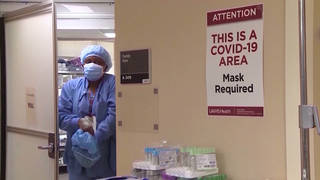
By Amy Goodman & Denis Moynihan
The COVID-19 pandemic, like a scab torn off a wound, has exposed systemic inequality and racism throughout our healthcare system. Now, the distribution of desperately needed vaccines is revealing even further the depths of inequity and immorality at the core of our globalized economy. Wealthy countries like the US, the UK, Canada and those in te EU are buying most of the global vaccine supply in advance — hoarding three to five times the amount of vaccines necessary to immunize their populations. Meanwhile, billions of people in poorer countries will likely wait well into 2022 or later before they even get a chance to receive a potentially life saving coronavirus vaccine.
The People’s Vaccine Alliance, a broad coalition including Oxfam, UNAIDS, Amnesty International and more, has formed to challenge this vaccine nationalism. “Nearly 70 poor countries will only be able to vaccinate one in ten people against COVID-19 next year unless urgent action is taken,” the Alliance’s website states. “Rich nations representing just 14 per cent of the world’s population have bought up 53 per cent of all the most promising vaccines so far.”
Oxfam’s Dr. Mohga Kamal-Yanni, a policy adviser to the People’s Vaccine Alliance, appeared on the Democracy Now! news hour from Oxford, England, where one of the most promising vaccines, from a partnership between Oxford University and the pharmaceutical giant AstraZeneca, is nearing approval. Oxford required AstraZeneca to include some distribution and pricing commitments as a condition of the collaboration. As a result, India, Brazil and Argentina will receive hundreds of millions of vaccine doses that they might have been unable to buy on the open market.
“You can’t leave the decision on supply, price, which country, which patient, to companies,” Kamal-Yanni said. “That’s not their job. Their job is to produce. The job of governments is to make more production, so you have to enable other producers [by] allowing the sharing of technology and removing the intellectual property barrier, so no patents on vaccines. Then other companies can produce the vaccine.”
Achal Prabhala, a public health advocate and coordinator of AccessIBSA, which campaigns for access to medicines in India, Brazil and South Africa, has been working for years to dismantle patent and intellectual property constraints on life saving drugs. His focus now is to ensure COVID-19 vaccines and therapeutics are available free of patents that make them too expensive for billions of people.
“South Africa and India made a proposal at the WTO, the World Trade Organization, to temporarily suspend a trade rule called TRIPS [Trade-Related Aspects of Intellectual Property Rights], which is an agreement on…intellectual property worldwide,” Prabhala explained on Democracy Now! “All WTO member countries should be exempted…so that everything that we require to survive the pandemic — the masks, the test kits, but now especially the vaccines — should be free to be made in as much capacity as possible to get them faster and cheaper to as many people as we can around the world.” The problem, he adds, is that “if five or six very rich countries oppose the proposal, it won’t pass.”
Prabhala’s work has become very personal: “My father had COVID. He’s 87 years old. My mother is 72 years old. I definitely would like them to have a vaccine and get one fairly quickly. The prospect of these vaccines being rolled out without any possibility of a majority of the world getting them is genuinely heartbreaking.”
His prescription is to treat COVID-19 vaccines the same way we deal with the flu. The annual flu vaccine is updated every flu season, to target the flu virus as it evolves over time. Prabhala described the global system behind the widely-available flu shot:
“It’s a collaborative infrastructure that they’ve set up at the WHO that involves 110 different countries, 130 different laboratories, which pool information on what strains of influenza are circulating in their countries. That information is collated…the WHO then releases what would be called the formula for the flu vaccine, which anyone anywhere can produce, completely free of any proprietary intellectual property or monopoly, which means that billions of people have taken it since the 1970s based on this cooperative, shared system of pooling knowledge, as well as finances.”
The coronavirus does not respect borders. While each nation has its own unique circumstances and response to the pandemic, no nation will be safe until all nations are safe. A coordinated, collective effort is absolutely critical. A people’s vaccine would prioritize global public health over the profits of pharmaceutical corporations, serving as a model for combating pandemics we face now and in the future.











Media Options